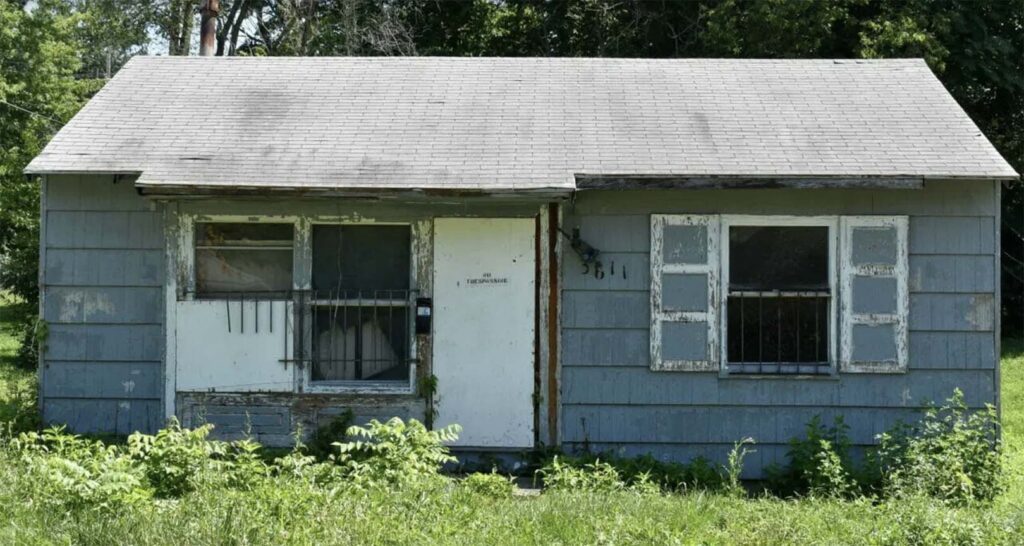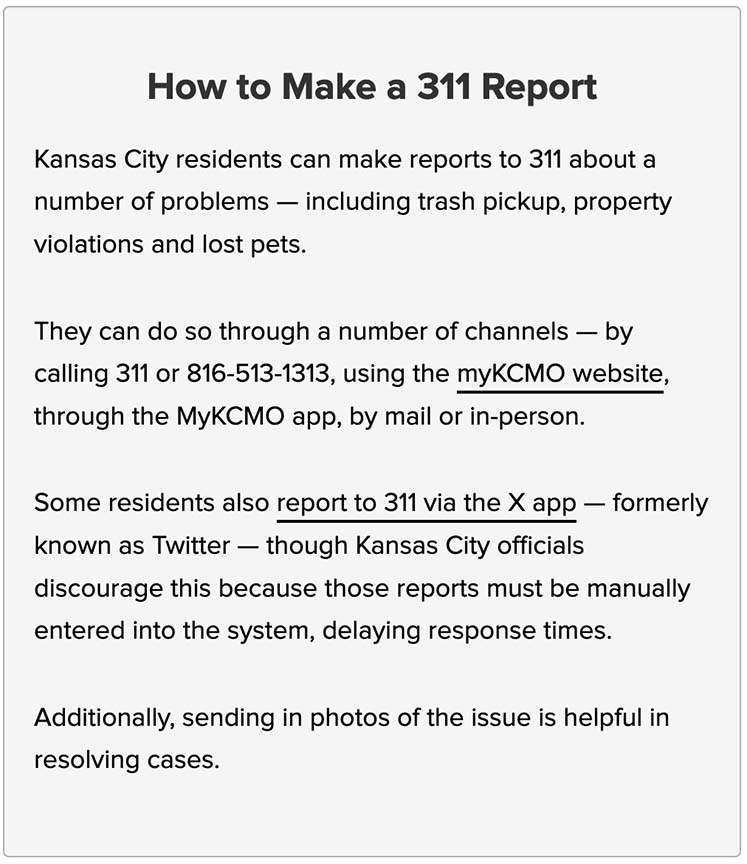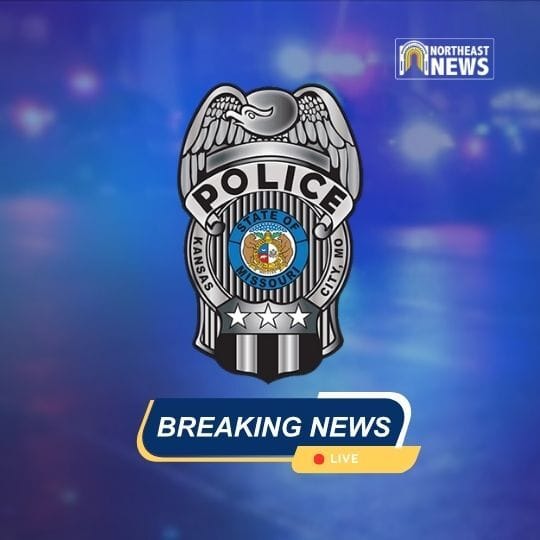
Julie Freijat
Josh Merchant
KC Media Collective
Eugenia Castro, who has lived in the Historic Northeast since 2018, has contacted the Kansas City 311 complaint hotline several times for issues ranging from illegal dumping to lost dogs. She’s had mixed results.
For instance, Castro contacted 311 to ask for “no motor vehicle” signs to be installed at a park near her. The signs recently were installed, she said.
“The other two issues I reported twice — they are not resolved. Part of the trash is still (in the) alleyway,” Castro said in an email. “Another neighbor told me she called 311 as well for the same issue.”
Residents across Kansas City, just like Castro, rely on the 311 system for solutions and answers.
A deep dive into the 311 program in Kansas City — including how the system operates and what might cause delays in case resolution — reveals the 311-related issues affecting residents. The analysis includes hundreds of thousands of 311 call center reports and interviews with people familiar with the system, the problems it addresses, or both.
The data examined ran from March 2021 through July 2023. (A complete methodology for the data gathering, cleaning and analysis can be found at the end of this story.)
Major findings include:
Trash-related reports and property violations (such as overgrown weeds and broken windows) are the top two issues reported across Kansas City.
Out of the six City Council districts, the 3rd and 5th Districts in eastern parts of the city reported the highest number of cases to 311 since 2021. The 3rd District experiences the longest average resolution time.
Some residents who are immigrants or refugees, particularly in the Northeast, struggle to understand the 311 process and end up in court for code violations as a result. Some local groups are stepping in to address this issue.
Difficulty contacting out-of-state landlords and absentee property owners can cause delays in the resolution of property violation cases.
What Kansas City 311 Data Says
Since March 2021, Kansas City residents have submitted more than 300,000 reports to the city’s 311 program. Those reports range from potholes and neglected properties to illegal dumping and flooded streets.
Using the boundaries prior to the 2021 redistricting, nearly one-fourth of 311 reports were placed in the 3rd District, with the highest number of reports citywide. The 2nd District in the Northland had the fewest reports, making up less than 10% of 311 reports citywide.
The raw count of 311 reports, however, does not necessarily indicate that certain areas are more prone to problems than others, City Manager Brian Platt said. It may also speak to awareness of the program.
“There are issues in every neighborhood, and when we see spots without any, that tells us that we’ve got to maybe talk to that group more to make sure we’re serving their needs,” Platt said. “We’ve not reached every person in the city, and it’s an ongoing challenge for us to make sure that everyone knows their resources and their options.”
The 3rd District, the source of the most reports, also had the slowest average resolution time. Using the median, 311 cases in the 3rd District were open for seven days, compared to the citywide median resolution time of six days.
In the northernmost and southernmost areas of the city, the most reported issue was trash or bulky item pickup. However, in the 3rd and 4th Districts, closer to the urban core, the most reported issue was property violations, which includes overgrown weeds, litter and trash, properties open to entry, unregistered vacant properties and more.
This could explain some of the disparities in overall median response time. Compared to issues like potholes or trash pickup, a property violation can require investigation and due process, often involving absentee property owners who can be difficult to reach. These issues take 55 days to resolve on average — much longer than the two days for trash or bulky item pickup.
As a result, council districts or neighborhoods with more property violations tend to have a slower average response time.
Among 247 neighborhoods in Kansas City, 311 reports can vary wildly.
Several neighborhoods in the Historic Northeast see many reports of property violations, including Independence Plaza, Lykins, Pendleton Heights and Indian Mound. These neighborhoods also have a higher average resolution time.
Troost Avenue, the historic economic and racial dividing line in Kansas City created by racist housing practices, is a clear marker of neighborhood disparities in average resolution time.
Neighborhoods west of Troost, particularly along the wealthy Ward Parkway corridor, have average resolution times ranging from three to five days. To the east, these averages are higher — seven days in Blue Hills, 11 days in Marlborough East and 14 days in Manheim Park and Ivanhoe Southwest.
Kansas City 311 Shortcomings
Castro lives in Indian Mound, a neighborhood that sits just south of the Missouri River in the Northeast.
In this neighborhood, about 10,000 residents from more than 100 countries speak 55 different languages. Here, the most common reports are property violations.
In a place like this, a fully functioning 311 program requires that the city be able to communicate with neighbors who speak Arabic, Burmese, Swahili, French, Spanish and a plethora of other languages. And although Kansas City contracts with a service to translate reports in these languages, many Northeast residents may not understand the city services available to them without translated government materials or outreach programs.
Castro — whose first language is Spanish — said that while calling 311 is easy for those who speak English, she thinks it would be better if the call takers could speak Spanish or provide an interpreter for callers who speak languages other than English.
“The response of 311 is good,” Castro wrote in an email, which she ran through a translation app. “You don’t need to wait too long to get a person to talk. For me, it was a little bit hard to understand the different options because of my language and because I don’t know how the laws work here in the U.S. I am still learning about many things.”
Eugenia Castro has made multiple reports to 311 related to illegal dumping near Budd Park. Though Castro has picked up the trash, more appears soon after, she said. Additionally, a pothole she previously reported that had been fixed has reopened near Budd Park. (Julie Freijat | Flatland)
Jean Ann Lawson, deputy director of the Neighborhood Services Department, said the 311 reporting system supports translation capabilities.
“We have bilingual call takers,” Lawson said. “And then we also have a service that we use so we can handle a call in any language.”
But Castro said that even though the menu offers Spanish as a language option when calling 311, she only talked with employees who spoke English.
Platt said that, ahead of the 2026 World Cup, the city is looking to expand its language capabilities in anticipation of the international tourists who are expected to come to Kansas City.
“We’re going to have visitors from every country in Europe and South America and Asia, and we have to be ready for that,” he said. “But it’s not just about 311, it’s about navigating our city and emergency issues that people might have. We’ve got to be ready for all of it.”
Patricia Hernandez, former president of the Indian Mound neighborhood association, said a culture and language barrier makes some of her neighbors not want to reach out to 311.
“I would say more English speakers definitely know about it,” she said. “But for refugee and immigrant communities who are still learning about how the municipal government and city code works, calling 311 is just out of their wheelhouse.”
Miscommunications also can cause delays in 311 resolution times.
For example, if a 311 report is reported in the wrong category or at the wrong address, it will take longer for the 311 center to file the report where it needs to go.
How to Make a 311 Report
Kansas City residents can make reports to 311 about a number of problems — including trash pickup, property violations and lost pets.
They can do so through a number of channels — by calling 311 or 816-513-1313, using the my
KCMO website, through the MyKCMO app, by mail or in-person.
Some residents also report to 311 via the X app — formerly known as Twitter — though Kansas City officials discourage this because those reports must be manually entered into the system, delaying response times.
Additionally, sending in photos of the issue is helpful in resolving cases.
About 20 people typically answer calls from 8 a.m. to 7 p.m. Once a request has been submitted, it is sent to the corresponding department.
Citywide, trash and recycling-related reports top the charts for the most commonly reported incident type. Property violations are the second most common 311 report type citywide.
Property violations are the most common report made out of every neighborhood in the Northeast except Columbus Park.
Hernandez said her neighborhood sees a high number of property violations at abandoned houses and vacant lots, in particular. Additionally, Indian Mound has seen an increase in homelessness in recent years, which brings a delicate set of issues along with it.
“That is what the majority of the 311 calls are — they’re abandoned houses, they’re folks that are squatting in the houses, squatting in the vacant lots, setting up camps in different areas, blighted homes,” Hernandez said. She also works with the Greater Kansas City Coalition to End Homelessness as an operations coordinator.
“We can call 311 on somebody experiencing homelessness all day, but there’s still no place for them to go,” Hernandez said.
And even when they do file a 311 report, she said that the city doesn’t have many options without the cooperation of the property owners. As a result, resolution times for these cases are “nonexistent.”
Helping Homeowners in the Northeast
Some of these property violations are reported against absentee property owners or out-of-state landlords. Others are reported against homeowners who can’t afford to make necessary repairs.
In some cases, homeowners in the Northeast have received alarming notices in the mail that their homes were violating city code, that they would be due in municipal court and that if they didn’t show up, they could be placed under arrest. This becomes even more alarming when a homeowner is not fluent in English or has a precarious immigration status.
These are situations in which local organizations such as Jerusalem Farm, a local Catholic intentional community, step in.
“311 can be a great tool to use when you have out-of-state landlords or people holding on to properties that don’t live in the neighborhood and are basically slumlords,” said Jordan Schiele, the project director at Jerusalem Farm. “But the problem is when homeowners get caught up in it, it doesn’t help them address their issue.”
Schiele said homeowners who face code violations often cannot afford to make the repairs that the city is asking them to make. As a result, they find themselves in a spiral of snowballing fines and potential displacement.
“I’ve had people tell me they no longer want to live in the Northeast because they’re tired of being harassed by code enforcement,” Schiele said.
In 2020, Jerusalem Farm, in partnership with the Mattie Rhodes Center and Re-BuildKC, worked on a pilot program in the Indian Mound neighborhood where they would be the first responders for property violations, rather than the city’s code inspectors.
If the property owner was not an English speaker, the staff members would connect them with community members who could communicate with them in their own language.
“If I got there and there was a situation that was against code, rather than giving them a letter right away saying that they were going to be facing fines and going to court and all this stuff, we’ll make the repairs,” Schiele said. “We would make sure they knew that the complaint was made, make sure they knew what their responsibilities were in maintaining their house and ask them if they had a plan, … and let them know about the resources that were available to them.”
This approach, Schiele said, is more effective at supporting homeowners who, given the resources, would choose to make repairs.
Councilwoman and Mayor Pro Tem Ryana Parks-Shaw, who represents the 5th District, said she has been working with the Blue Hills neighborhood in her district on a similar pilot program.
“Many times, some of the violations that we see are because people don’t have the knowledge or resources to be able to fix the issues,” Parks-Shaw said. “The neighborhood liaisons, their role has been expanded to not just be (punitive) ticket writers, but to connect those homeowners with resources to assist them with fixing whatever those issues are.”
Andrea Bough, who represents the 6th District at-large on the City Council, said the city is exploring new ways to deal with property violations, which were a major issue in the southeastern areas of her district that were moved into the 5th District when the boundaries were redrawn.
“Is it, you know, someone’s grandma who has just fallen ill and can’t fix up the property?” she said. “Let’s see if we (the city) can help fix up that property…If you had enough money to pay the fine, you’d probably fix your roof.”
Out-of-state Landlords Cause Delays
While Kansas City explores ways to make code enforcement less punitive for homeowners who simply can’t afford to repair their houses, a different strategy is required for absentee property owners and out-of-state investors.
For these properties, it can be difficult to track down contact information or even the name of an owner — particularly when the property ownership is embedded in a limited liability company (LLC). In some cases, these LLCs are registered in states like Delaware, where business records are scarce and difficult to follow.
Platt said the issue of absentee owners comes up “a lot” — particularly in neighborhoods east of Troost Avenue.
“If we can’t get in touch with somebody who’s there physically, we can send mail, we can document communications that we make,” Platt said. “Sometimes you need a warrant through the court to access property if we don’t get a response.”
Neighborhoods in the Historic Northeast are very familiar with this issue.
In January, a fire knocked out the power at an apartment complex in the Northeast, where 19 complaints had been filed over the previous 12 months — including eight property violations and four Healthy Homes complaints. Neither the building’s tenants nor city officials could reach the landlord for several days during the emergency.
A study of out-of-state owners in 2021 showed that about one-third of rental homes are owned by people or corporations outside of Missouri, but they were responsible for more than half of all evictions during the COVID-19 pandemic.
And more corporations are becoming property owners in Kansas City.
Nearly one-sixth of houses that were sold in 2021 in Missouri were sold to corporate buyers, including out-of-state investment companies. A study in Cincinnati found that these houses were less likely to reenter the market, with owners deferring maintenance for years.
When absentee owners are unreachable, it also interferes with the city’s ability to regulate and enforce energy efficiency standards. When unaddressed, insulation and energy issues can result in mold infestations and fires.
“Some of the frustration comes from people who are dealing with out-of-town landlords or property owners who are not consistent and also can’t really be contacted,” said Jonathan Cokely, security chair for the Pendleton Heights Neighborhood Association. “And there doesn’t really seem to be a clear process in place to try to hold those property owners more
accountable.”
These properties pepper Kansas City’s Northeast, Schiele said.
Homes owned by LLCs might be sitting vacant and not boarded up, Schiele said, and concerned neighbors might not be able to find out who the owner is.
“There are a lot of residents that live in homes that probably would be considered unsafe or unlivable, because of the lack of investment in those rental homes,” Schiele said. “You see that
all throughout the Northeast.”
Julie Freijat is a Dow Jones reporting intern at Kansas City PBS. She is a masters student at the University of Missouri. Josh Merchant is a local government reporter with The Kansas City Beacon, a member of the KC Media Collective.




















